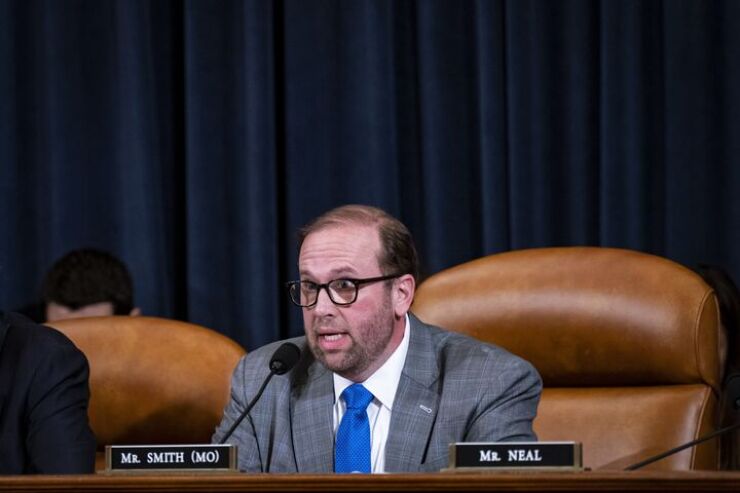ESG effect on pension plans raises concern
3 min read

Debates about the effects of using environmental, social, and governance measures to determine where funds should be invested is echoing through the public finance community and the halls of Congress.
“Democrats are trying to enshrine so called environmental, social and governance ideology into America’s financial system by removing protections for savers in the tax code,” said Jason Smith, R-Mo., chair of the powerful House Ways and Means Committee.” This political crusade threatens the $33 trillion Americans have saved for retirement.”
The comments came during the Republican-controlled Committee hearing on Tuesday that was lightly focused on protecting senior citizens from losing their savings through questionable investment decisions. Democrats countered by questioning why the Committee was attempting to re-legislate ESG questions that have already been decided when more pressing matters should be addressed.
“We’re on a countdown to a shut down,” said Lloyd Doggett, D-Texas. “Not content with having shut down this House of Representatives with no legislative action for an entire three weeks, we are going to be four days from a shutdown of the government next Monday. Instead of dealing with that crisis, what we’re dealing with today is wokeness.”
After former Speaker Kevin McCarthy R-Calif. was thrown from his seat Oct. 5, the House successfully elected Rep. Mike Johnson, R-La., to assume the positio Oct. 25. In the meantime, key appropriation bills remain unpassed along with financial aid packages to Israel and Ukraine. The stakes go higher as the country hurtles towards another possible government shutdown Nov. 18 if agreements can’t be reached between the House and Senate.
ESG continues to hold sway over the world of public finance as municipalities issuing debt grapple with boosting and disclosing their own ESG efforts. The ESG label on funds carries cachet with some investors but has also inspired a backlash, especially in oil producing states where the petroleum industry provides jobs and a tax base.
Committee members and witnesses presented conflicting data about how the movement is affecting investments. There was agreement from both sides that the term’s meaning is lost on many investors.
“The simple truth is that most Americans are not familiar with ESG investing,” said Brandon Rees, deputy director, AFL-CIO Office of Investment. “They trust their retirement plans to make these decisions, not politicians, and they certainly don’t like the idea of the government restricting their ability to invest responsibly.”
ESG remains a potent force in the bond market. Last week Refinitive reported that ESG issuance for the first three quarters of 2023 was at $27.97 billion, potentially on pace to beat 2022’s total of $32.71 billion. The numbers are certainly on pace to shatter 2020’s total of $16.62 billion. Bloomberg indicates that as of mid-October, states and localities had priced $31 billion of ESG-labeled bonds versus the $40.5 billion seen in 2022.
ESG became an area of federal interest via a 2022 Labor Department ruling that allows fiduciaries to consider ESG factors as they invest in privately-held retirement plans. The ruling generated a lawsuit brought by 26 Republican-led states that was then denied via a judicial ruling in September. In March Congress sent legislation that would have repealed Labor’s resolution, to the President’s desk which spurred Biden’s first veto.







